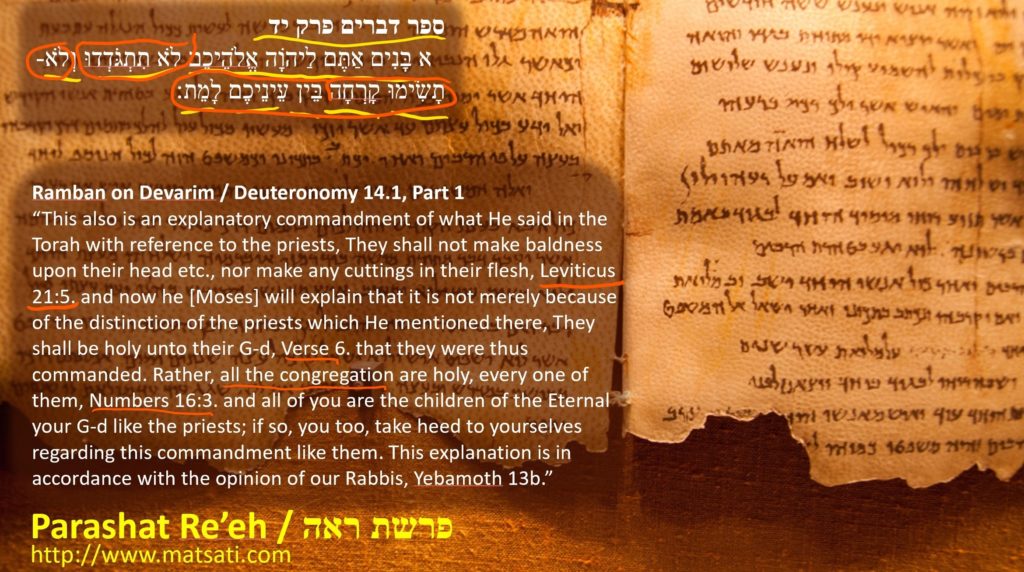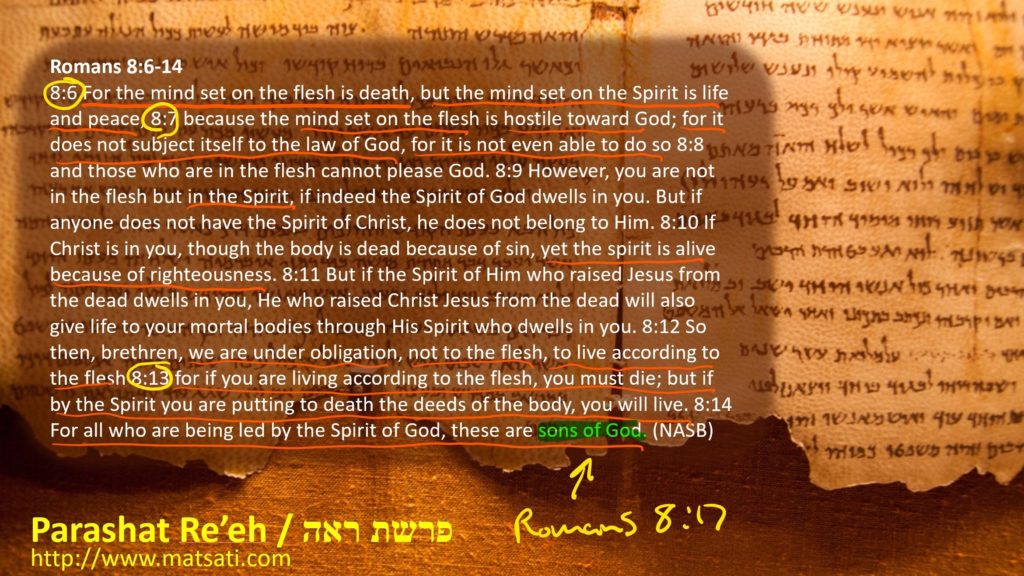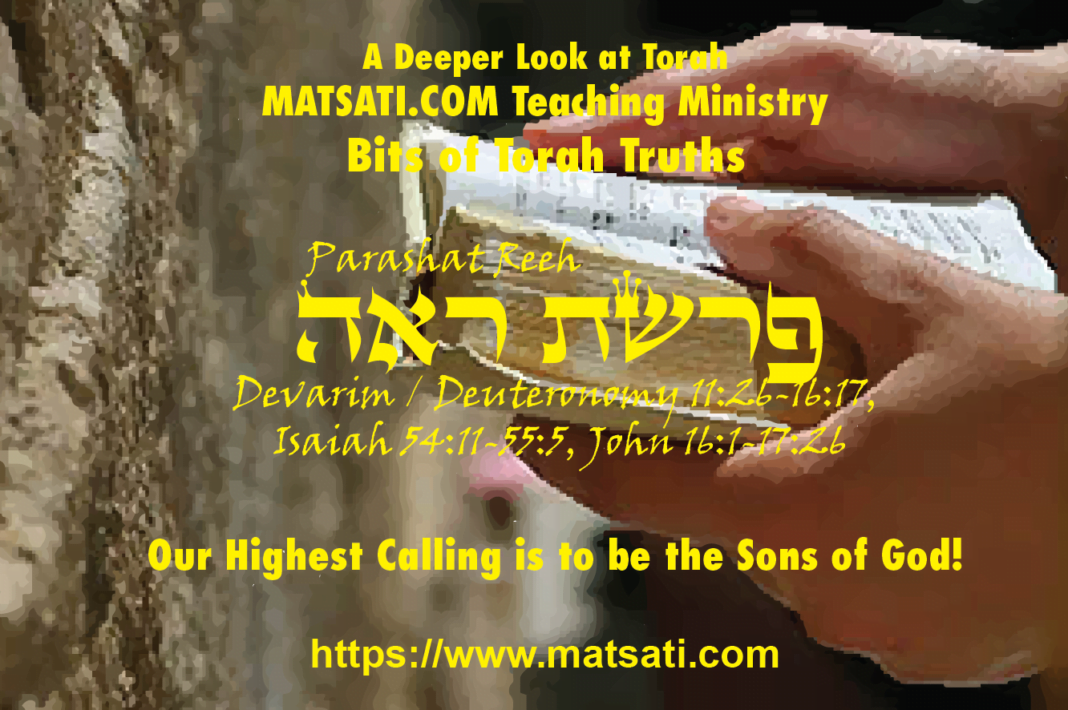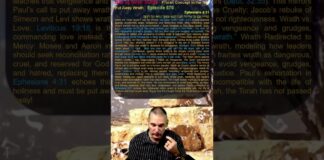The name of the weekly Torah portion is taken from the first distinct word in the Parashah. Parashat Re’eh (רְאֵה) means “see” and is the 47th weekly Torah portion (פָּרָשָׁה, parashah) in the annual Torah reading cycle, from the Book of Deuteronomy. In this week’s reading, Moses set before the Israelites the choice between the blessing and curse. Moses instructed the people in the חקות (laws) that they were to obey, including the חק (law) of a single centralized place of worship. Moses warned against following other gods and their prophets and set forth the חק of kashrut, tithes, the Sabbatical year, the Hebrew slave, firstborn animals, and the shelosh regalim (three pilgrimage festivals: Passover, Shavuot, and Succot). The verses we are looking at for this week are from Devarim / Deuteronomy 14:1 ,א בָּנִים אַתֶּם לַיהוָֹה אֱלֹהֵיכֶם לֹא תִתְגֹּדְדוּ וְלֹא-תָשִֹימוּ קָרְחָה בֵּין עֵינֵיכֶם לָמֵת: 1 “You are sons of the Lord your God; you shall not cut yourselves nor shave a bald spot above your forehead for the dead. (NASB) Notice the text states, בָּנִים אַתֶּם לַיהוָֹה אֱלֹהֵיכֶם written in the masculine plural forms (בָּנִים אַתֶּם) is a reference to the entire nation as being the children of God. The idea of being a son of God reminds us of what the narrative says regarding Yeshua and his disciples according to John 12:1 “But as many as received him, to them gave he power to become the sons of God, even them that believe on his name” and in Mishley / Proverbs 18:10, מִגְדַּל־עֹ֭ז שֵׁ֣ם יְהוָ֑ה בּֽוֹ־יָר֖וּץ צַדִּ֣יק וְנִשְׂגָּֽב׃ “the name of the Lord is a strong tower and in Him the righteous run and are lifted up (exalted).” In Proverbs, it is in the Name of the Lord we find safety, strength, and salvation. We are being told how God gives those who believe in Him to be the בָּנִים אַתֶּם לַיהוָֹה אֱלֹהֵיכֶם (you are the sons of the Lord your God). The idea is that believing we know we are the children of God and that the Lord loves us much more than a father loves his son. The idea here comes from the sense of whether we understand the commands or not. Note also the kind of commands that we find juxtaposed to Devarim / Deuteronomy 14 that are coupled to this idea of being the sons of God! This introductory statement to chapter 14, בָּנִים אַתֶּם לַיהוָֹה אֱלֹהֵיכֶם “you are the sons of the Lord your God,” speaks to us regarding if we do not understand God’s actions or His commands, we are to resolve to being as children, who also do not understand what their father does but nevertheless trust and rely upon him. Moshe writes “For you are a holy people,” this is why we are given the commands that we are not to emulate the practices of the nations saying, לֹא תִתְגֹּדְדוּ “you are not to make cuts in yourself” וְלֹא-תָשִֹימוּ קָרְחָה בֵּין עֵינֵיכֶם לָמֵת “and not make bald spot between the eyes for the dead” where the NASB translates this as “nor shave a bald spot above your forehead for the dead.” We think about this for a moment, these were cultic practices as Baal worshipers would cut themselves as demonstrated in 1 Kings 18 on mount Carmel. The idea is we are not to imitate their practices. These opening statements quantify the reasons why God also says “you shall not eat any abominable thing.” (ג לֹא תֹאכַל כָּל-תּוֹעֵבָה) These things teach is that we are to be holy in what we do and in our mouth, (Ibn Ezra) and we note how what we say comes from our heart and so all of who we are is to be holy. Rambam states the following regarding Devarim / Deuteronomy 14:1 .

“This also is an explanatory commandment of what He said in the Torah with reference to the priests, They shall not make baldness upon their head etc., nor make any cuttings in their flesh, Leviticus 21:5. and now he [Moses] will explain that it is not merely because of the distinction of the priests which He mentioned there, They shall be holy unto their G-d, Verse 6. that they were thus commanded. Rather, all the congregation are holy, every one of them, Numbers 16:3. and all of you are the children of the Eternal your G-d like the priests; if so, you too, take heed to yourselves regarding this commandment like them. This explanation is in accordance with the opinion of our Rabbis, Yebamoth 13b.”
RAMBAN ON DEVARIM / DEUTERONOMY 14.1, PART 1
Now this is a very significant observation as the scriptures state that all the nation of the people of Israel are priests. In relation to the average man, if we consider what it says in Devarim / Deuteronomy 14:1, בָּנִים אַתֶּם לַיהוָֹה אֱלֹהֵיכֶם לֹא תִתְגֹּדְדוּ “you are sons of the Lord your God, you are not to cut yourself,” the idea is if the priest had his hair torn out and his flesh cut, he would not be fit for the Divine Service. This is paralleled to what is written, “and they shall not profane the Name of their God.” (Vayikra / Leviticus 21:6) If we consider the significance of these things, how relevant is this today as being put into the service of God in the Messiah Yeshua?
The verses we are looking at for this week are from Devarim / Deuteronomy 14:1-21.
ספר דברים פרק יד
א בָּנִים אַתֶּם לַיהוָֹה אֱלֹהֵיכֶם לֹא תִתְגֹּדְדוּ וְלֹא-תָשִֹימוּ קָרְחָה בֵּין עֵינֵיכֶם לָמֵת: ב כִּי עַם קָדוֹשׁ אַתָּה לַיהוָֹה אֱלֹהֶיךָ וּבְךָ בָּחַר יְהֹוָה לִהְיוֹת לוֹ לְעַם סְגֻלָּה מִכֹּל הָעַמִּים אֲשֶׁר עַל-פְּנֵי הָאֲדָמָה: ס ג לֹא תֹאכַל כָּל-תּוֹעֵבָה: ד זֹאת הַבְּהֵמָה אֲשֶׁר תֹּאכֵלוּ שׁוֹר שֵֹה כְשָֹבִים וְשֵֹה עִזִּים: ה אַיָּל וּצְבִי וְיַחְמוּר וְאַקּוֹ וְדִישֹׁן וּתְאוֹ וָזָמֶר: ו וְכָל-בְּהֵמָה מַפְרֶסֶת פַּרְסָה וְשֹׁסַעַת שֶׁסַע שְׁתֵּי פְרָסוֹת מַעֲלַת גֵּרָה בַּבְּהֵמָה אֹתָהּ תֹּאכֵלוּ: ז אַךְ אֶת-זֶה לֹא תֹאכְלוּ מִמַּעֲלֵי הַגֵּרָה וּמִמַּפְרִיסֵי הַפַּרְסָה הַשְּׁסוּעָה אֶת-הַגָּמָל וְאֶת-הָאַרְנֶבֶת וְאֶת-הַשָּׁפָן כִּי-מַעֲלֵה גֵרָה הֵמָּה וּפַרְסָה לֹא הִפְרִיסוּ טְמֵאִים הֵם לָכֶם: ח וְאֶת-הַחֲזִיר כִּי-מַפְרִיס פַּרְסָה הוּא וְלֹא גֵרָה טָמֵא הוּא לָכֶם מִבְּשָֹרָם לֹא תֹאכֵלוּ וּבְנִבְלָתָם לֹא תִגָּעוּ: ס ט אֶת-זֶה תֹּאכְלוּ מִכֹּל אֲשֶׁר בַּמָּיִם כֹּל אֲשֶׁר-לוֹ סְנַפִּיר וְקַשְֹקֶשֶֹת תֹּאכֵלוּ: י וְכֹל אֲשֶׁר אֵין-לוֹ סְנַפִּיר וְקַשְֹקֶשֶֹת לֹא תֹאכֵלוּ טָמֵא הוּא לָכֶם: ס יא כָּל-צִפּוֹר טְהֹרָה תֹּאכֵלוּ: יב וְזֶה אֲשֶׁר לֹא-תֹאכְלוּ מֵהֶם הַנֶּשֶׁר וְהַפֶּרֶס וְהָעָזְנִיָּה: יג וְהָרָאָה וְאֶת-הָאַיָּה וְהַדַּיָּה לְמִינָהּ: יד וְאֵת כָּל-עֹרֵב לְמִינוֹ: טו וְאֵת בַּת הַיַּעֲנָה וְאֶת-הַתַּחְמָס וְאֶת-הַשָּׁחַף וְאֶת-הַנֵּץ לְמִינֵהוּ: טז אֶת-הַכּוֹס וְאֶת-הַיַּנְשׁוּף וְהַתִּנְשָׁמֶת: יז וְהַקָּאָת וְאֶת-הָרָחָמָה וְאֶת-הַשָּׁלָךְ: יח וְהַחֲסִידָה וְהָאֲנָפָה לְמִינָהּ וְהַדּוּכִיפַת וְהָעֲטַלֵּף: יט וְכֹל שֶׁרֶץ הָעוֹף טָמֵא הוּא לָכֶם לֹא יֵאָכֵלוּ: כ כָּל-עוֹף טָהוֹר תֹּאכֵלוּ: כא לֹא-תֹאכְלוּ כָל-נְבֵלָה לַגֵּר אֲשֶׁר-בִּשְׁעָרֶיךָ תִּתְּנֶנָּה וַאֲכָלָהּ אוֹ מָכֹר לְנָכְרִי כִּי עַם קָדוֹשׁ אַתָּה לַיהוָֹה אֱלֹהֶיךָ לֹא-תְבַשֵּׁל גְּדִי בַּחֲלֵב אִמּוֹ:
Devarim / Deuteronomy 14:1-21
1 “You are sons of the Lord your God; you shall not cut yourselves nor shave a bald spot above your forehead for the dead. 2 For you are a holy people to the Lord your God, and the Lord has chosen you to be a people for His personal possession out of all the peoples who are on the face of the earth. 3 “You shall not eat any detestable thing. 4 These are the animals that you may eat: the ox, the sheep, the goat, 5 the deer, the gazelle, the roebuck, the wild goat, the ibex, the antelope, and the mountain sheep. 6 And any animal that has a divided hoof and has its hoofs split in two, and chews the cud, among the animals, that animal you may eat. 7 However, you are not to eat these among the ones that chew the cud, or among those that have the hoof divided in two: the camel, the rabbit, and the rock hyrax, for though they chew the cud, they do not have a divided hoof; they are unclean to you. 8 And the pig, because it has a divided hoof but does not chew the cud, it is unclean for you. You shall not eat any of their flesh, nor touch their CARCASSES. 9 “These you may eat of everything that is in the water: anything that has fins and scales you may eat, 10 but anything that does not have fins and scales, you shall not eat; it is unclean for YOU. 11 “You may eat any clean bird. 12 But these are the ones that you shall not eat: the eagle and the vulture and the buzzard, 13 and the red kite, the falcon, and the kite in their kinds, 14 and every raven in its kind, 15 and the ostrich, the owl, the seagull, and the hawk in their kinds, 16 the little owl, the great owl, the white owl, 17 the pelican, the carrion vulture, the cormorant, 18 the stork, and the heron in their kinds, and the hoopoe and the bat. 19 And all the swarming insects with wings are unclean to you; they shall not be eaten. 20 You may eat any clean bird. 21 “You shall not eat anything which dies of itself. You may give it to the stranger who is in your town, so that he may eat it, or you may sell it to a stranger; for you are a holy people to the Lord your God. You shall not boil a young goat in its mother’s milk. (NASB)
Thinking about what is written in Devarim / Deuteronomy 14:1, in the past I had never really considered how important this scripture is. The reason being, the practice of cutting or shaving our heads for the dead doesn’t exist today. (I say this in regards to cultural norms generally speaking; there may be fringe groups however who do these things somewhere in the world today.) What we are learning in this verse is connected to the priestly command, as well as the command for all of the nation as a whole from the sense of not profaning the name of God. Living like the nations profanes our service before God! Rashi explains that seeing that we are Hashem’s children, it is incumbent upon us not to disfigure “His” property. Ultimately, your body belongs to Him. These things speak to our being bought by God, having a relationship with God, and the transformation of our lives! The Torah speaks at length about transformation, God choosing a people, and in the wilderness of those who were willing to live in such a manner as to become the sons and daughters of God. This is the very point of our salvation, and God’s plan for salvation. These things also speak of the necessity of God being involved in our lives and of His Messiah’s involvement in our physical transformation into the likeness of His Son. (Note this is what the Scriptures say, we are glorified in Him and He is glorified in us! Read Romans 8:30) This is the point of God delivering to us His Words so that we can know who we are and what we are to become, how we are to live, and the power that we have with the presence of God in our lives! Notice how the Apostle Paul wrote concerning these things according to his letter to Romans.

Romans 8:6-14
8:6 For the mind set on the flesh is death, but the mind set on the Spirit is life and peace, 8:7 because the mind set on the flesh is hostile toward God; for it does not subject itself to the law of God, for it is not even able to do so 8:8 and those who are in the flesh cannot please God. 8:9 However, you are not in the flesh but in the Spirit, if indeed the Spirit of God dwells in you. But if anyone does not have the Spirit of Christ, he does not belong to Him. 8:10 If Christ is in you, though the body is dead because of sin, yet the spirit is alive because of righteousness. 8:11 But if the Spirit of Him who raised Jesus from the dead dwells in you, He who raised Christ Jesus from the dead will also give life to your mortal bodies through His Spirit who dwells in you. 8:12 So then, brethren, we are under obligation, not to the flesh, to live according to the flesh 8:13 for if you are living according to the flesh, you must die; but if by the Spirit you are putting to death the deeds of the body, you will live. 8:14 For all who are being led by the Spirit of God, these are sons of God. (NASB)
Here Paul speaks of the mind, the body, and the spirit. He says the mind that is set upon the flesh is death (8:6), and this is because such a mind is hostile towards God (8:7). Why is the mind that is set upon the body / flesh hostile towards God? Paul writes because such a mind does not subject itself to the Torah of God! (שֶׁהֲרֵי מַחְשְׁבוֹת הַבָּשָׂר עוֹיְנוֹת אֶת אֱלֹהִים מִפְּנֵי שֶׁאֵינָן נִכְנָעוֹת לְתוֹרַת אֱלֹהִים, אַף אֵינָן יְכוֹלוֹת לְהִכָּנַע) He goes as far to say that such a person isn’t even able to subject himself to God’s Torah. Note the significance of this statement. These things are connected to the verses in this week’s Torah portion when Paul wrote, “For all who are being led by the Spirit of God, these are sons of God.” (Romans 8:14) This means that if we are being led by the Spirit we will be walking in God’s ways and obeying His Torah! Paul connects the Spirit of God dwelling in our midst, to being made alive in the Spirit because of righteousness, and the power of God to raise Yeshua up is present to raise us up also to live our lives for the Lord according to His Word. His conclusion is if we are living by the Spirit we are putting to death the sinful deeds of the body. (8:13) These things characterize those who are the “sons of God” who have faith and are living faithfully. This is how Paul removed the cultural differences between Jewish and Gentile converts and established the covenantal oneness that defines the disciples of Yeshua. Those who are led by the Spirit of God become heirs of God, and joint-heirs with Christ. (see Romans 8:17) So what Paul is speaking of here is that the person who is in a covenant relationship with God, and is a son or daughter of God, will base their lives upon God’s Word living righteously and be active interacting with the Holy Spirit of God. This is what the verse from Devarim / Deuteronomy 14:1 is teaching us saying, בָּנִים אַתֶּם לַיהוָֹה אֱלֹהֵיכֶם לֹא תִתְגֹּדְדוּ “you are sons of the Lord your God, you are not to cut yourself,” the idea is connected to whether we are willing or unwilling to be fit for Divine service. Note this is a choice, whether we are willing to obey God’s word, or be rebellious and walk in our own ways! Paul is speaking in similar terms as not walking according to the Spirit one is not fit for Divine service but is hostile towards God (8:7) and such a person who lives his life like this unrepentant must / will die (8:13). These things parallel “and they shall not profane the Name of their God.” (Vayikra / Leviticus 21:6) by being wilfully disobedient to God’s Word and teaching others to do the same. If we consider the significance of these things, this is very heavy and very relevant especially in light of the high calling that we have in the Messiah Yeshua!









